It’s a familiar scene by now: a smiley person sitting somewhere on a tropical beach with a laptop over their thighs looking disgustingly happy. (Even though the laptop is probably full of sand and the overheated battery is burning a brand mark on their legs.)
You know who that is! It’s your friendly neighbourhood, digital nomad!
I’m sure most working folks have had the wild dream of quitting it all to roam the world. After all, isn’t it the dream to exchange the drab office walls for palm trees? Or move your home office to a view of mountains? Be your own boss and work your own hours?
As dreamy as the work remotely abroad dream sounds, many people stay in the dream stage of planning because they are worried about the uncertainty of the lifestyle. But what if I told you that you don’t need to quit your job at all? You can still get the best parts of being a digital nomad while pulling in a steady paycheck.
So, if you want to check out the nomad life with minimal commitment, keep reading! Here are my TOP tips on how to work remotely and travel.

Photo: @amandaadraper
The Broke Backpacker is supported by you. Clicking through our links may earn us a small affiliate commission, and that's what allows us to keep producing free content 🙂 Learn more.

Unlock Our GREATEST Travel Secrets!
Sign up for our newsletter and get the best travel tips delivered right to your inbox.
Digital Nomads and Remote Workers – What’s the Difference?
So, what actually is the difference between digital nomads and remote workers? Technically, there really isn’t one. But for the sake of this article, let’s say that there is a small distinction that can be made.
Digital nomads’ lifetyle essentially entails working online from somewhere else than one’s home city or country. Most digital nomads are freelancers or entrepreneurs, meaning they are some flavour of self-employed.
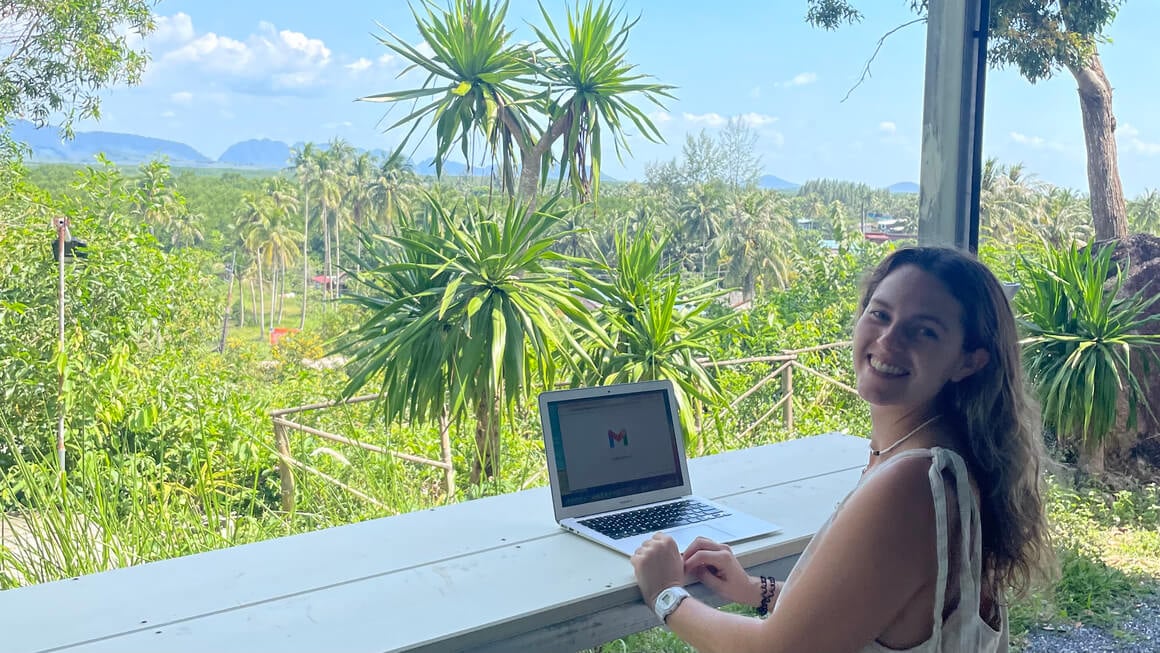
Photo: @danielle_wyatt
Remote workers would in this context be people that are employed by a company, organisation, or any other employer. Many digital nomads are also employed but in my experience of the digital nomad lifestyle, this is a little bit rarer than being self-employed.
In the digital nomad life, the narrative of quitting your job to travel the world is a very common one. There is a whole slew of jobs for remote workers which many wanderers learn from scratch to be able to travel. Obviously, remote workers don’t need to quit anything – they already have a job you can do remotely.
The Benefits of Working Abroad
Life as a digital nomad is definitely a life of freedom and flexibility. You get to be your own boss, decide how much you work and where you live.
Becoming a digital nomad also comes with a lot of uncertainty. Unless you’re always working with the same, steady clients, you often have to spend a lot of time chasing down new work. Freelancing can be financially risky, and there are no consequences for your clients if they decide to suddenly drop you.
Being employed, you usually have all the benefits that come with being a cushiony office worker. Some companies offer occupational health services to help employees, this would include things like paid sick leave, occupational health care and insurance. Your employer also has to follow employment laws and obligations, meaning that even if your employment relationship ends, the employer is gonna have to give you at least a couple of weeks of notice.
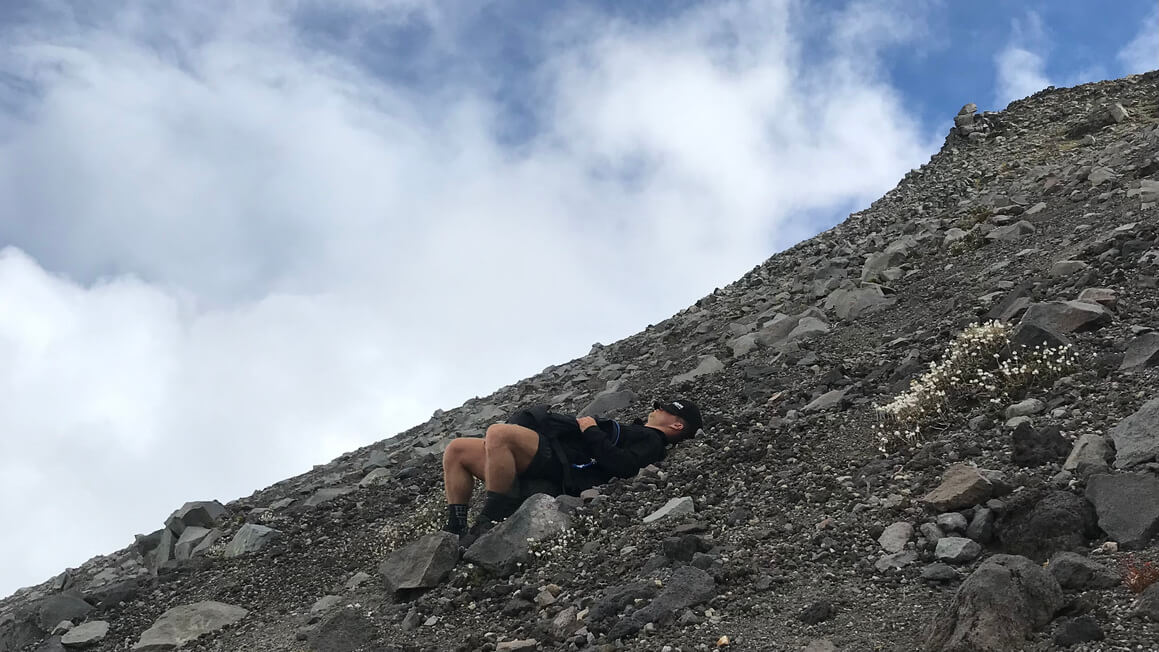
Photo: @danielle_wyatt
In addition, depending on where you live in the world, you’re almost guaranteed to cut down on your bills. Accommodation, eating out and general living costs can be cheaper than what you’re used to, and you might have fewer utility bills to pay.
So, you basically get the benefits of being a digital nomad with more stability.
Usually working for someone means that you have to work their hours – a solid 8 hours, no matter where you are in the world and how inconvenient this is for your current time zone. On the other hand, you get a steady paycheck every month, which is enough incentive for a lot of people to deal with the inconvenience.
Want to save money on accommodation?
Enjoy 15% OFF on stays ALL around the world.
Before You Start to Work Remotely and Travel
I’m not gonna ask you silly questions like, well, are you convinced? If you’ve read this far, I’m gonna assume you’re along for the ride. Working remotely and travelling is definitely easier than a lot of people think but there are some things you should double-check before leaving if you have an employer.
Let’s look at a few things you should take care of when you’re starting to plan how to work remotely abroad.
Talk to Your Boss
Unfortunately, it’s usually not possible for you to just take off and leave if you’re employed by a company. Before making your move, you should talk to your boss about it and make sure that it is even possible.
Technically, as long as your work can be done remotely from home office, it can be done remotely from anywhere. Many remote workers have actually noticed that they are a lot more productive and effective at their work when working from home and have some more flexibility in how to arrange their work.

Photo: @joemiddlehurst
Your boss might still need some extra persuasion. You can always agree on a trial period and see how that goes.
Smaller companies are usually more flexible with remote or hybrid work but larger companies often have even pretty strict policies and restrictions in place. Even if your boss agrees to let you work remotely from abroad, investigate if it could affect your company’s benefits.
For example, your company’s health insurance will probably not cover your time abroad but you’ll be required to get a separate travel insurance policy.
Month to month payments, no lock-in contracts, and no itineraries required: that’s the exact kind of insurance digital nomads and long-term traveller types need. Cover yo’ pretty little self while you live the DREAM!
SafetyWing is cheap, easy, and admin-free: just sign up lickety-split so you can get back to work! Click the button below to learn more about SafetyWing’s setup or read our insider review for the full tasty scoop.
Pack and Plan What You Need
And by this, I don’t mean three suitcases full of tuxedos and briefcases, or whatever office people wear. The neat thing about working remotely is that moving around is easy since you’re supposed to travel pretty light, so don’t stuff your nomad backpack totally full.
However, do make sure you take some stuff that you normally wouldn’t bring on a holiday. It’s surprising how distracting working in a new environment can be. Here are a few quick tips to make sure you’ll continue to focus on your work.

Photo: @danielle_wyatt
- Get noise-cancelling headphones. Distractions are the death of motivation to work.
- Make (and stick to!) a work schedule. Time management is surprisingly difficult if you’re a newbie at it!
- Pack some conference call appropriate clothes. This is important if you’ll be doing lots of Zoom meetings (formal trousers optional).
- Necessary office supplies: pens, notebooks, calendar, and anything else that you might need.
- Electronics: Travel adapter, a mouse if you use one, international eSIM or an unlocked phone
For more ideas about what you might need, take a look at our digital nomad packing list.
Taxes, Taxes, Taxes
Your employer is probably interested to know about your tax payment plan. More specifically – that you are going to pay some while working remotely and travelling.

Every country has different conventions on paying taxes. As a rule of thumb, you technically become a tax citizen if you stay in a country for more than six months.
In reality, though, becoming a tax citizen can be an annoying, complex process, and people usually go through it when they’re actually moving somewhere, not when they’re visiting temporarily.
In some cases, this might also mean that you’d be paying tax to two different countries. Luckily, many countries have regulations to stop this kind of double taxation.
Figure out how your taxation works based on how long you’ll be away, and what you’ll be paying. For example, I pay taxes to my home country because all my employers and work are from there, but I don’t pay for some normally mandatory insurance policies because I’m not physically in the country.
Work Permits
Now, this is a pretty important point: many countries don’t allow foreigners to work while holidaying without a work permit or visa.
Digital nomads are a bit of a grey area in this legislation and most countries don’t really have straightforward rules for this.
Usually, you wouldn’t count as a worker unless you’re earning money in the country itself – meaning, you’re working for a local employer. If your employer and work all come from a different country, there shouldn’t actually be a problem with working remotely.
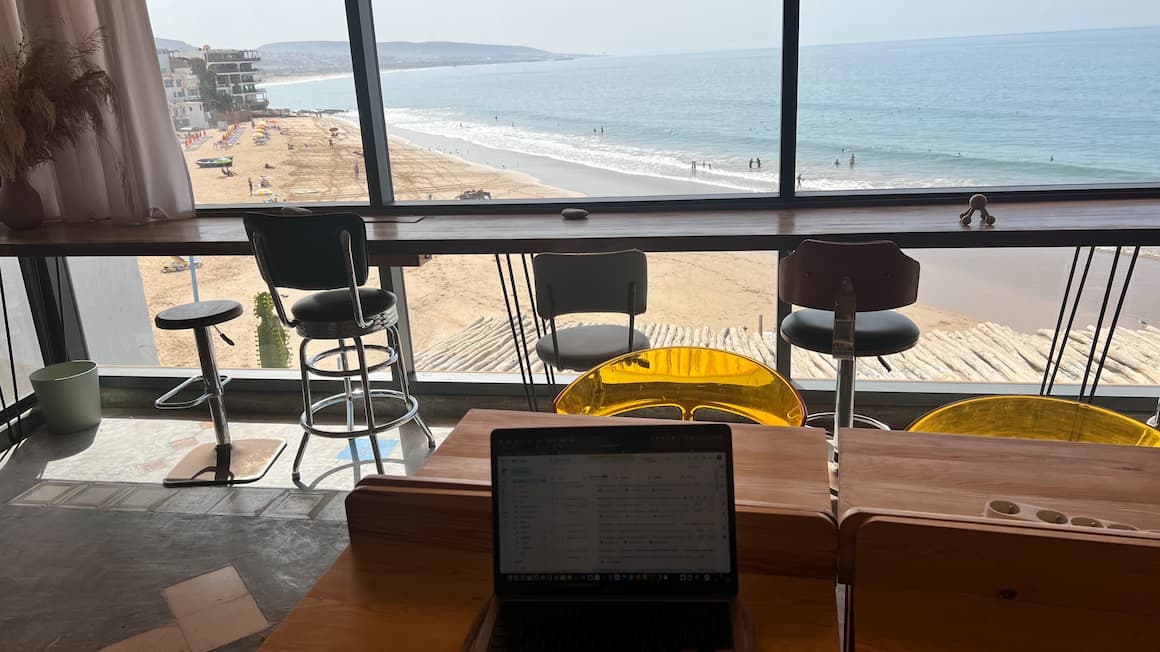
Photo: @amandaadraper
However, some countries have stricter work laws and would also rule that working for foreign employers would not be allowed.
In general, you can just tell at immigration that you’re there for a holiday and not mention anything about work. (Prepare to present your savings in case they ask how you’re going to support yourself on your lengthy holiday.)
Some countries have also started offering visas for digital nomads and remote workers which could be an excellent option for you.

We’ve tested countless backpacks over the years, but there’s one that has always been the best and remains the best buy for adventurers: the broke backpacker-approved Osprey Aether and Ariel series.
Want more deetz on why these packs are so damn perfect? Then read our comprehensive review for the inside scoop!
View on Osprey View on REIDo You HAVE to Tell Your Boss You’re Abroad?
One problem with jetting off abroad while you’re employed is that employers often have rules regarding places of work. While most employers might be fine with remote work itself, you probably have to make a separate agreement to be able to work even in a different region, let around a different country.
Some customers have agreements against data transfers outside of their region, which could be a problem if your remote workcation takes you to another continent. For example, working for a US company from Europe could mean that you wouldn’t be allowed to take your work materials outside of the country.
Your employer might also have policies in place to ensure their data security and prohibit working using public wifis.

Oh, bureaucracy is so fun!
All of these could be (valid) reasons why you think your boss might deny you to work remotely while abroad. So, you might wonder – do you have to tell your boss at all?
And as much as I’d like to encourage honesty and integrity, the truth is that many people don’t, and many people do get away with it. There’s that famous saying of asking for forgiveness rather than permission, right? And with the right clothes and Zoom background, how would they know?
This can be an option for you if you’re willing to maybe get in trouble.
Tips for the Best Remote Work and Travel Experience
Okay, so now that we’ve got the annoying formalities out of the way and you know more about how to work remotely and travel, let’s move on. Here are some practical tips that can take your remote work and travel experience from “good” to “absolutely epic”.
Join a Co-Working Space
First step: Find a digital nomad-friendly country.
Second step: Find the most popular city in said country.
Where digital nomads gather, there you’ll also find a platter of options for optimal work spots. While many nomads like to work from home or from cafes, for people who are used to the comforts of an office environment, a co-working space might be more of your speed.
Co-working spaces are usually equipped with good desks and chairs, stable wifi, and all the other comforts you could hope to find in a normal office. The best kind of coworking spaces also organise events that help with professional networking and making friends.
Make sure to check out Tribal Bali, the best coworking hostel for digital nomads.
Join a Remote Work Programme
One of the most difficult parts of being a digital nomad is the constant movement between places and always having to make new friends, look for apartments, scout out co-working spaces… It can be stressful. Creating a global network of digital nomad friends takes a while.

Photo: @rizwaandharsey
Remote work programmes are meant to make all of this easier. Ever take a Contiki tour back when you went backpacking? Remote work programmes basically operate on a similar idea. You give the company money and they take care of all the basic stuff like organising your accommodation and working spaces while putting you together with a similarly minded group of friends.
You can find programmes spanning from just a few weeks to months so they are easy to fit around your remote work and travel trial.
The program might end up costing slightly more than if you planned everything yourself. However, if you’re new to the world of remote work and travel, letting someone else take the reins saves you a lot of headaches.
Learn to Balance Work and Travel
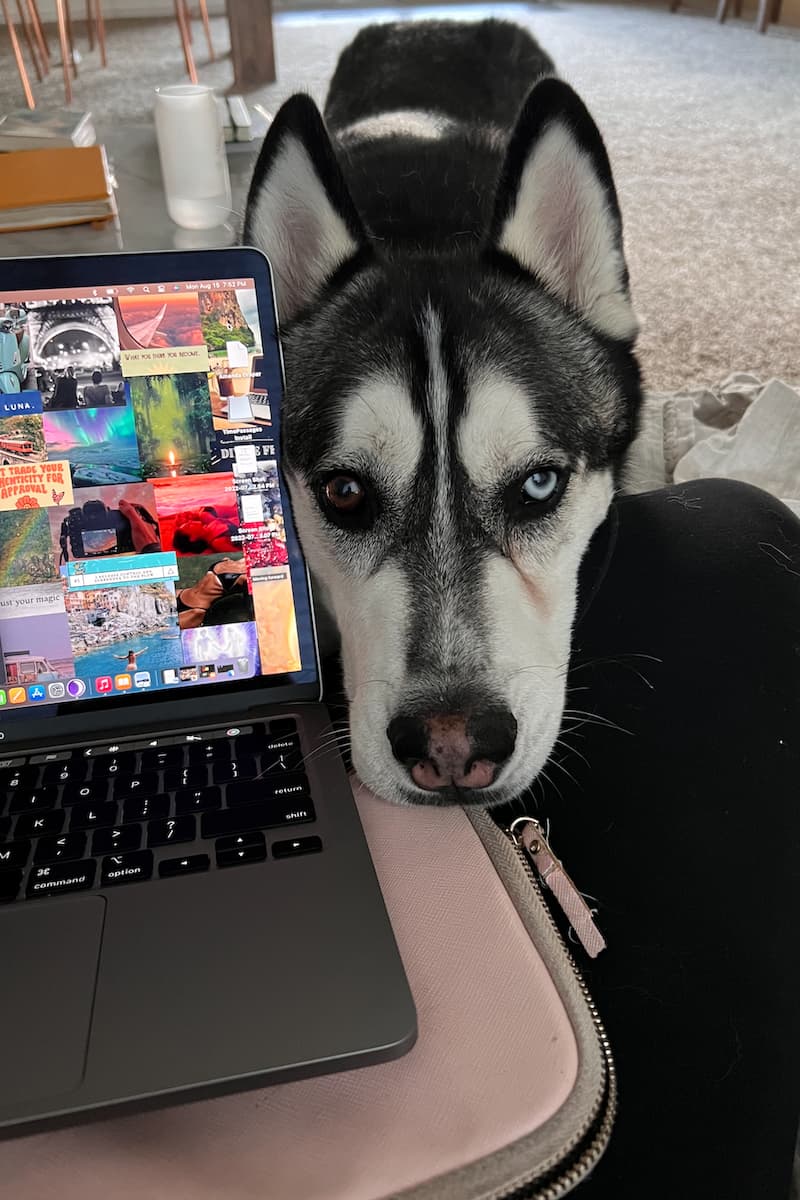
Photo: @amandaadraper
Take it from me, a digital nomad of almost half a decade and a bona fide backpacker for years before that – working SIMULTANEOUSLY while travelling is really, really hard.
Travelling – unless you’re on a beach vacation – is hard work and between unreliable wifi, time spent in transportation, and the stress of constantly moving places, working soon becomes a second priority to rest and play.
Ideally, you’re travelling with your laptop to experience a new place or country slowly, not in the mad rush of a holidaymaker. Make sure you still work the hours you need and focus on exploring in the evenings and on the weekends.
Often, remote work doesn’t even have to rely all that heavily on the travel part. Sometimes it’s simply nice to be somewhere else, even if you’re keeping the same routines as back home.
Remote work is also a good option for people living in the cold North, which allows you to escape somewhere warmer for a few months.

A new country, a new contract, a new piece of plastic – booooring. Instead, buy an eSIM!
Jetpac eSIMs work just like an app: you download it, pick your plan, and BOOM! You’re connected the minute you land. It’s that easy.
Read about how e-Sims work or click below to see one of the top eSIM providers on the market and ditch the plastic.
Grab an eSIM!You Don’t Have to Work Remotely Abroad
If you’re having a hard time convincing your boss to let you go frolicking abroad for a few months, try thinking a little smaller.
There are probably many wonderful places to experience in your own country, too! (I’m especially jealous of people working remotely for a US company. Visiting the United States basically offers fifty different countries just in itself!)

Photo: @amandaadraper
Accommodation statistics show that more and more people are booking Airbnbs specifically for work-related staycations. You could take a few weeks on the mountains or on the beach, check out the food scene in another city or go visit relatives.
This gives you all the benefits of working and travelling – you get a change of scenery and new experiences – while not needing to deal with the trickiest parts of working abroad like visas, phone plans, internet troubles or language barriers.
Option: Find a Job that Includes Travel
For many die-hard travellers, working remotely while travelling is not enough. You might want to make travel an inseparable part of your actual work.
Some jobs that include travelling are obviously work in the tourism industry: pilots, flight attendants, cruise ship crew and tour guides all get to see the world while actually getting paid for it.
(So do travel writers, but making money travel blogging can be tough these days, and there are not many full-time employed travel writer’s positions up for grabs in 2024.)
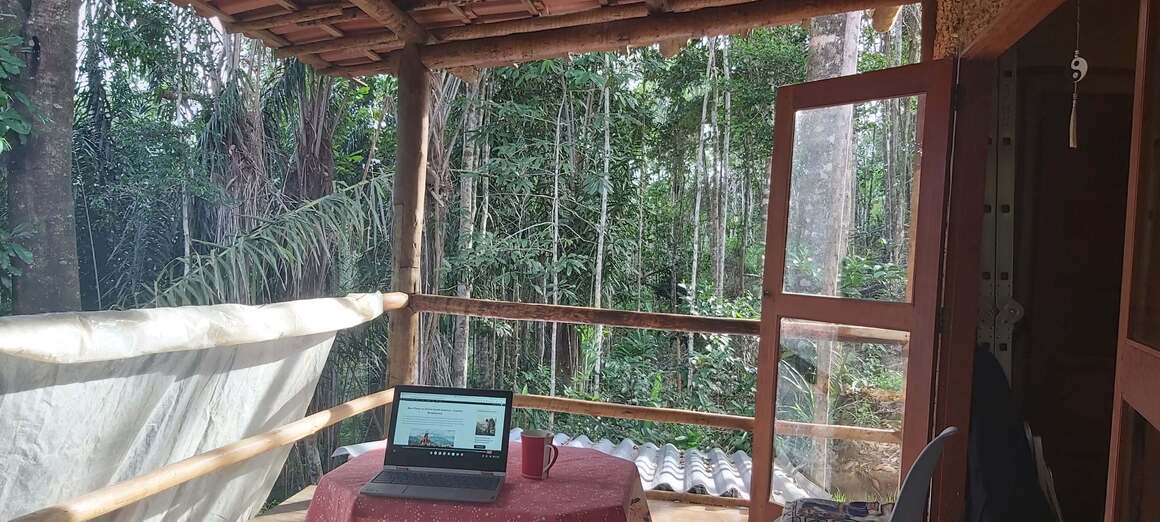
Photo: @Lauramcblonde
You might also want to find work that allows you to equalise time between work and time off. For example, you could be working four weeks on, four weeks off, which gives you a whole month to travel wherever you want. I’ve met a surprising amount of people working jobs like this – wildlife rangers, bush pilots, and miners, just to mention a few.
Ready, Set, Remote Work & Travel
So, there you have it – a short teaser trailer to the life of working remotely while travelling.
Does this sound like this could suit you?
If there’s anything good that came out of the last couple of years, it’s more people realising that working remotely and travelling doesn’t just have to be a remote dream (pun intended).
When the pandemic forced many people into their home offices, employers also realised that many jobs could be done outside of the office. (This essentially makes them digital nomad jobs.) This was revolutionary for the new generation of digital nomads and remote workers.
Many jobs, now, offer the option to work remotely or in a hybrid format with just a couple of days of the week at the actual workplace.
Now, you could just return to the office and forget about palm trees and exotic mountain ranges. But do you really want to do that?
The digital nomad life is not for everyone but there is a reason why millions of people are trying it out now. The flexibility, freedom, and possibility to experience life in different places is something I value more than anything, and would not change it for the world.
If you’re the least bit curious, take the plunge. What’s the worst that could happen – your boss says no Most likely, your boss is already answering their emails with a daiquiri in hand on a beach in Mexico.
- Once you start nomad-ing, travelling will never be quite the same. This is how becoming a digital nomad changes travel.
- You should go be a nomad – it’s a rockin’ time! Here are the best digitals nomad hostels for some real fun!
- And please don’t hit travel burnout. Remember, balance is KEY!
- I accidentally fell in love with Bali! Here’s why being a Bali nomad is EPIC.
- Or, head west to the beautiful Mexico! Here are all my tips and tricks for being a digital nomad in Mexico.
- Take a look at the best travel jobs to make money while travelling.

Buy Us a Coffee!
A couple of you lovely readers suggested we set up a tip jar for direct support as an alternative to booking through our links. So we created one!
You can now buy The Broke Backpacker a coffee. If you like and use our content to plan your trips, it’s a much appreciated way to show appreciation 🙂








